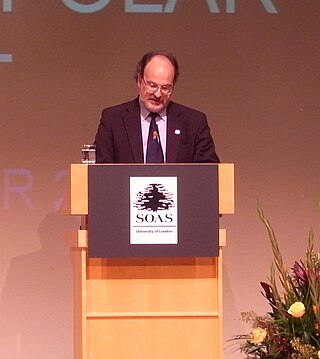Related Research Articles

Educational psychology is the branch of psychology concerned with the scientific study of human learning. The study of learning processes, from both cognitive and behavioral perspectives, allows researchers to understand individual differences in intelligence, cognitive development, affect, motivation, self-regulation, and self-concept, as well as their role in learning. The field of educational psychology relies heavily on quantitative methods, including testing and measurement, to enhance educational activities related to instructional design, classroom management, and assessment, which serve to facilitate learning processes in various educational settings across the lifespan.

Psychology is the scientific study of mind and behavior. Psychology includes the study of conscious and unconscious phenomena, including feelings and thoughts. It is an academic discipline of immense scope, crossing the boundaries between the natural and social sciences. Psychologists seek an understanding of the emergent properties of brains, linking the discipline to neuroscience. As social scientists, psychologists aim to understand the behavior of individuals and groups. Ψ (psi), the first letter of the Greek word psyche from which the term psychology is derived, is commonly associated with the science.

Edward Lee Thorndike was an American psychologist who spent nearly his entire career at Teachers College, Columbia University. His work on comparative psychology and the learning process led to the theory of connectionism and helped lay the scientific foundation for educational psychology. He also worked on solving industrial problems, such as employee exams and testing. He was a member of the board of the Psychological Corporation and served as president of the American Psychological Association in 1912. A Review of General Psychology survey, published in 2002, ranked Thorndike as the ninth-most cited psychologist of the 20th century. Edward Thorndike had a powerful impact on reinforcement theory and behavior analysis, providing the basic framework for empirical laws in behavior psychology with his law of effect. Through his contributions to the behavioral psychology field came his major impacts on education, where the law of effect has great influence in the classroom.
Operant conditioning, also called instrumental conditioning, is a learning process where behaviors are modified through the association of stimuli with reinforcement or punishment. In it, operants—behaviors that affect one's environment—are conditioned to occur or not occur depending on the environmental consequences of the behavior.

Learning is the process of acquiring new understanding, knowledge, behaviors, skills, values, attitudes, and preferences. The ability to learn is possessed by humans, animals, and some machines; there is also evidence for some kind of learning in certain plants. Some learning is immediate, induced by a single event, but much skill and knowledge accumulate from repeated experiences. The changes induced by learning often last a lifetime, and it is hard to distinguish learned material that seems to be "lost" from that which cannot be retrieved.
Classical conditioning is a behavioral procedure in which a biologically potent stimulus is paired with a previously neutral stimulus. It also refers to the learning process that results from this pairing, through which the neutral stimulus comes to elicit a response that is usually similar to the one elicited by the potent stimulus.

Animal cognition encompasses the mental capacities of non-human animals including insect cognition. The study of animal conditioning and learning used in this field was developed from comparative psychology. It has also been strongly influenced by research in ethology, behavioral ecology, and evolutionary psychology; the alternative name cognitive ethology is sometimes used. Many behaviors associated with the term animal intelligence are also subsumed within animal cognition.
Metacognition is an awareness of one's thought processes and an understanding of the patterns behind them. The term comes from the root word meta, meaning "beyond", or "on top of". Metacognition can take many forms, such as reflecting on one's ways of thinking and knowing when and how to use particular strategies for problem-solving. There are generally two components of metacognition: (1) knowledge about cognition and (2) regulation of cognition.

Clark Leonard Hull was an American psychologist who sought to explain learning and motivation by scientific laws of behavior. Hull is known for his debates with Edward C. Tolman. He is also known for his work in drive theory.

Self-determination theory (SDT) is a macro theory of human motivation and personality that concerns people's innate growth tendencies and innate psychological needs. It pertains to the motivation behind people's choices in the absence of external influences and distractions. SDT focuses on the degree to which human behavior is self-motivated and self-determined.

Latent learning is the subconscious retention of information without reinforcement or motivation. In latent learning, one changes behavior only when there is sufficient motivation later than when they subconsciously retained the information.

Allan R. Wagner was an American experimental psychologist and learning theorist, whose work focused upon the basic determinants of associative learning and habituation. He co-authored the influential Rescorla–Wagner model of Pavlovian conditioning (1972) as well as the Standard Operating Procedures or "Sometimes Opponent Process" (SOP) theory of associative learning (1981), the Affective Extension of SOP and the Replaced Elements Model (REM) of configural representation. His research involved extensive study of the conditioned eyeblink response of the rabbit, of which he was one of the initial investigators (1964).

Paul Webley CBE was director and principal of the School of Oriental and African Studies, University of London from 2006 to 2015. From 2010 until his death in 2016, he was Deputy Vice-Chancellor of the University of London. He was a member of the editorial board of the Journal of Economic Psychology and a former president of the International Association for Research in Economic Psychology.

The reward system is a group of neural structures responsible for incentive salience, associative learning, and positively-valenced emotions, particularly ones involving pleasure as a core component. Reward is the attractive and motivational property of a stimulus that induces appetitive behavior, also known as approach behavior, and consummatory behavior. A rewarding stimulus has been described as "any stimulus, object, event, activity, or situation that has the potential to make us approach and consume it is by definition a reward". In operant conditioning, rewarding stimuli function as positive reinforcers; however, the converse statement also holds true: positive reinforcers are rewarding.

Edward Tory Higgins is the Stanley Schachter Professor of Psychology, Professor of Business, and Director of the Motivation Science Center at Columbia University. Higgins' research areas include motivation and cognition, judgment and decision-making, and social cognition. Most of his works focus on priming, self-discrepancy theory, and regulatory focus theory. He is also the author of Beyond Pleasure and Pain: How Motivation Works, and Focus: Use Different Ways of Seeing the World for Success and Influence.
William Kaye Estes was an American psychologist. A Review of General Psychology survey, published in 2002, ranked Estes as the 77th most cited psychologist of the 20th century. In order to develop a statistical explanation for the learning phenomena, William Kaye Estes developed the Stimulus Sampling Theory in 1950 which suggested that a stimulus-response association is learned on a single trial; however, the learning process is continuous and consists of the accumulation of distinct stimulus-response pairings.
E-learning theory describes the cognitive science principles of effective multimedia learning using electronic educational technology.
Richard Shiffrin is an American psychologist, professor of cognitive science in the Department of Psychological and Brain Sciences at Indiana University, Bloomington. Shiffrin has contributed a number of theories of attention and memory to the field of psychology. He co-authored the Atkinson–Shiffrin model of memory in 1968 with Richard Atkinson, who was his academic adviser at the time. In 1977, he published a theory of attention with Walter Schneider. With Jeroen G.W. Raaijmakers in 1980, Shiffrin published the Search of Associative Memory (SAM) model, which has served as the standard model of recall for cognitive psychologists well into the 2000s. He extended the SAM model with the Retrieving Effectively From Memory (REM) model in 1997 with Mark Steyvers.
The study of memory incorporates research methodologies from neuropsychology, human development and animal testing using a wide range of species. The complex phenomenon of memory is explored by combining evidence from many areas of research. New technologies, experimental methods and animal experimentation have led to an increased understanding of the workings of memory.
Abram Amsel was a Canadian-born American psychologist and faculty member at several universities. A member of the National Academy of Sciences and a Fellow of the American Association for the Advancement of Science, he conducted influential research into concepts of reward and nonreward in learning and behavior. Later, his research shifted from learning theory to neurobiology.
References
- ↑ e.g. Tarpy, R. M., St Claire-Smith, R., & Roberts, J. E. (1986). The effect of informational stimuli on instrumental response rate - signaling reward versus signaling the availability of reward. Quarterly Journal of Experimental Psychology, Section B: Comparative and Physiological Psychology, 38, 173-189.
- ↑ e.g. Lea, S. E. G., & Tarpy, R. M (1986). Hamsters' demand for food to eat and hoard as a function of deprivation and cost. Animal Behaviour, 34, 1759-1768. doi:10.1016/S0003-3472(86)80262-7
- ↑ e.g. Tarpy, R. M., & Scharer, J. B (1994). Ivanov-Smolensky conditioning: Relationship between CR and UR form and intensity. Biological Psychology, 37, 247-258. doi:10.1016/0301-0511(94)90006-X
- ↑ see footnote to Tarpy, R. M. (1969). Reinforcement difference limen (rdl) for delay in shock escape. Journal of Experimental Psychology, 79, 116-121. doi:10.1037/h0026988
- ↑ Williams College faculty list 1972-73 http://static1.1.sqspcdn.com/static/f/951429/17344316/1332867091493/Williams+Faculty+1971-72.pdf?token=X9Ma22CtkDQUR1v%2BlTWsh5uZm0Y%3D
- ↑ see University of Exeter Calendar, 1981-82
- ↑ Mid-Atlantic District Member Search, http://www.midatlanticdistrict.com/?Code=Members&ID=155865